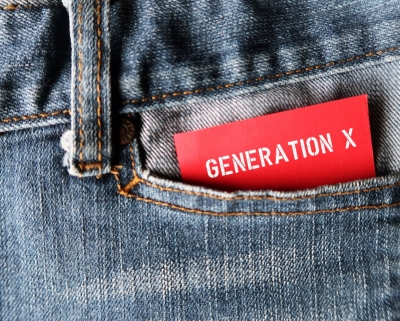Article
11 Excellent Holiday Emails from Sephora, American Eagle and Adidas
December 20, 2018

Email is the most lucrative marketing channel in general, but especially during the holiday season. According to Mailcharts, email marketing drives 20% of holiday sales. And yet, many retailers don’t use it to its full potential, settling for the tired batch-and-blast approach. Enough generic messages in our inboxes made the likes of Sephora, American Eagle Outfitters and Adidas stand out that much more.
Adidas came in tenth on our Retail Personalization Index, while American Eagle placed sixth and Sephora, of course, topped the list. On the Index, email was something of litmus test for a brand’s overall personalization prowess. Breaking down the scores by channel, 12 retailers scored at least 25 of the 30 available points in the email category. Of the dozen, 91.6% were in the top half, 75% made the top quintile and 50% cracked the top 10.
That’s why we decided to zero in on our top performers. From driving store traffic and online gift card purchases to creating a sense of urgency with rich media, each one of these brands did something special to catch our eye over the past few weeks. Here are examples from our top 10. And since Adidas and ShoeDazzle tied for tenth place, we’ve even included an eleventh email strategy as a bonus.
Sephora
Few brands do product recommendations as well as Sephora, the two-time champion of the Retail Personalization Index. However, that strategy is more challenging during the holidays, when more people are buying gifts. That’s why Sephora sent emails that consisted of festive graphics directing people to a gift-giving quiz. Shoppers answered a few questions to point Sephora in the right direction, and they got the brand’s signature recommendations.
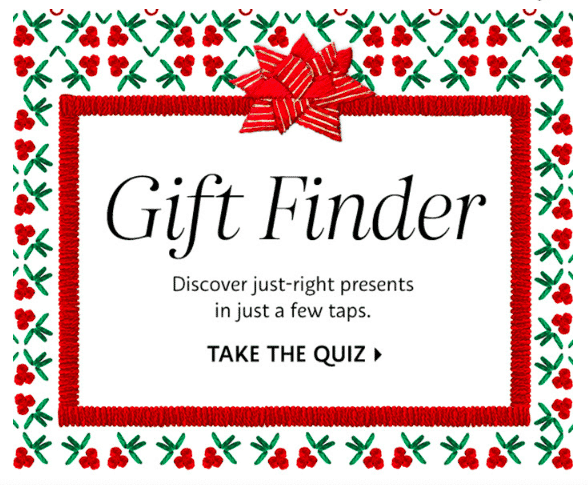
The Body Shop
When we surveyed consumers about their attitudes toward brick-and-mortar retail, we found that email is a common catalyst for getting people there. This Body Shop email is all about driving store traffic by promising experiences that can’t be replicated online. Sure, you could fill up an online shopping cart, but the Community Trade jute pouch sounds way more fun.
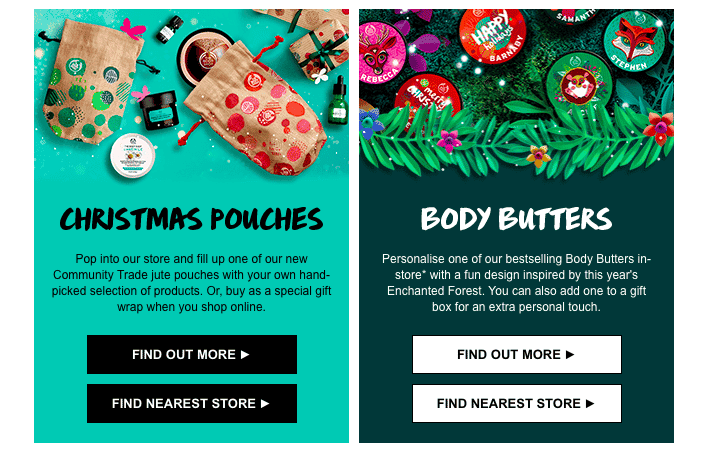
Walmart
There are countless strategies for product recommendations: bestsellers, new arrivals, trending items, staff picks, influencer recommendations. Walmart had a great approach for the latter, including Jen Hadfield’s kitchenware picks. Also known as @tatertotsandjello, Jen shares recipes and crafts with 109,000 Instagram followers and nearly three times as many on Pinterest. If she says she likes this waffle maker, people are going to take note.
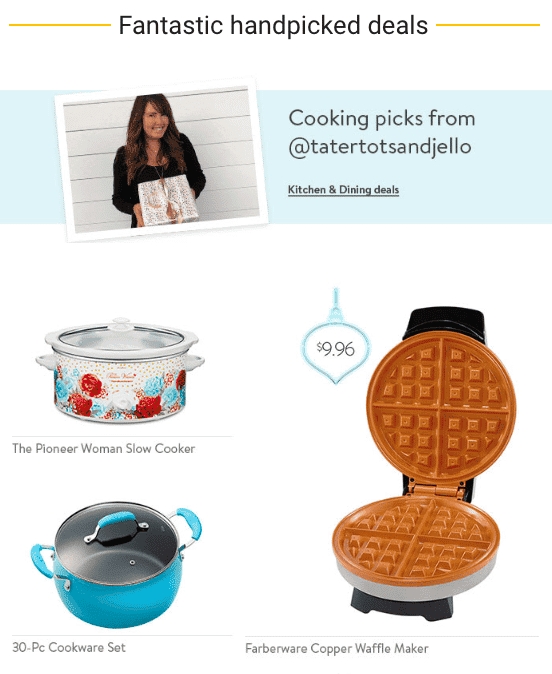
Urban Outfitters
No retailer made it to the upper echelon of our Personalization Index without knowing their customers exceptionally well. But that doesn’t mean they know what people want to buy for others. We like the way Urban Outfitters took out the guesswork by segmenting their gift guides by price. That way, the brand doesn’t bother recommending a herb-growing starter kit, as cool as it may be, to someone whose office Secret Santa has a strict $25 cap.
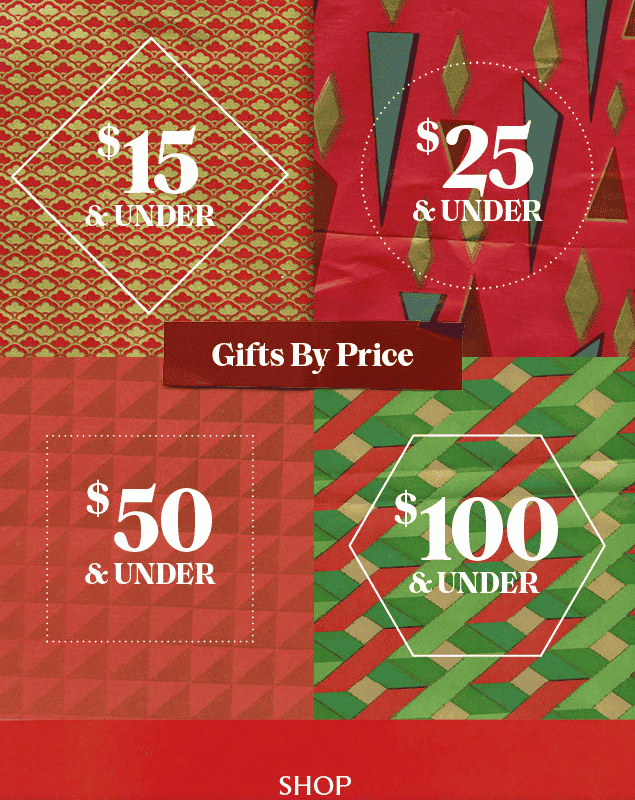
eBay
Before free two-day shipping was commonplace, the second Monday in December was the unofficial deadline for online shoppers to guarantee pre-Christmas deliveries. eBay sends solid “Green Monday” messages, which is fitting since they coined the term back in 2007. These dynamic emails, which let shoppers know the best deals every hour, create a sense of urgency with countdown clocks and “Almost Gone” stamps. Our only gripe: Shouldn’t the the header be green and not red?)
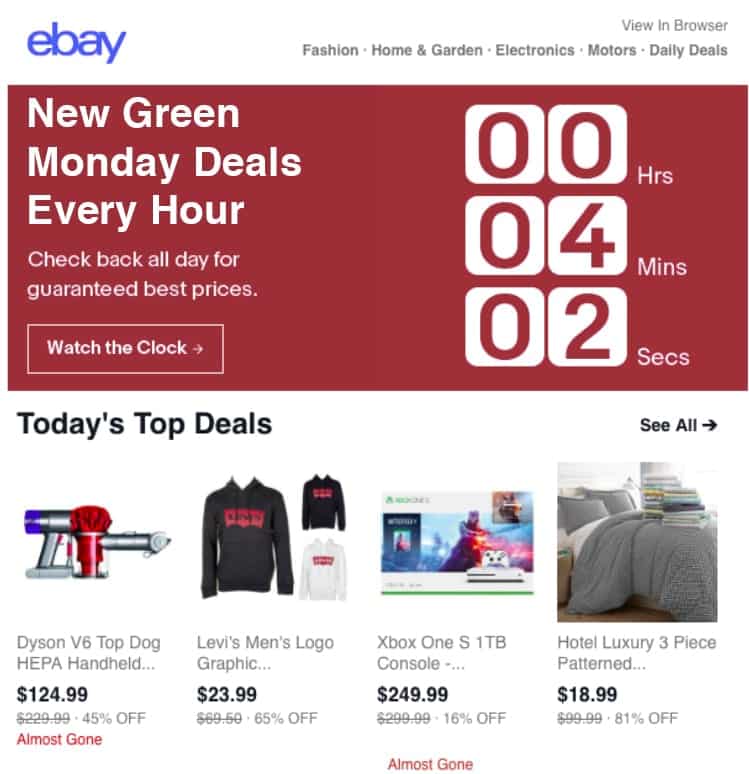
American Eagle Outfitters
Retailers create gift guides for him, for her, for moms and kids, travel junkies and athletes, and on and on. American Eagle’s holiday emails recommend gift for various segments, of course. However, American Eagle is also one of the only brands we’ve seen prominently promote gift cards, both analog and digital. It’s a great strategy because it eliminates any guesswork on behalf of the gift-giver and besides, who doesn’t love the gift of shopping?
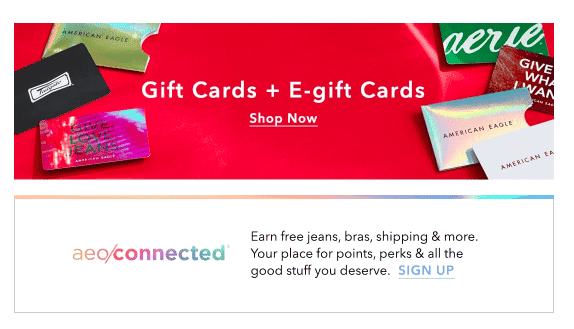
Net-a-Porter
Cyber Weekend is perhaps the craziest five-day stretch in an inbox’s year. Right after it ended, Net-a-Porter asked its customers for feedback. The email was as simple and minimalistic, right down to the subject line: “We’d love to hear from you.” By asking about customer’s shopping experience then, that gave Net-a-Porter the opportunity to right any wrongs before the holiday shopping season was over.
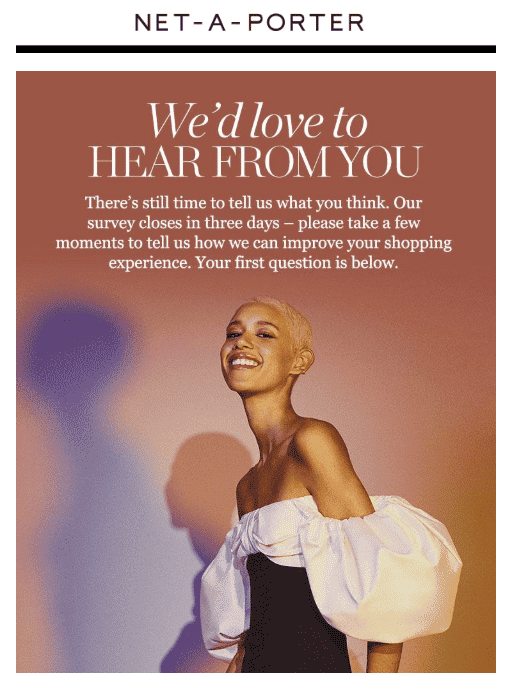
JustFab
eBay’s countdown clock seems far less urgent next to this Black Friday email from JustFab, which had “URGENT: 2 FOR $24 ????”as the subject line. We love how the brand pushed urgency and exclusivity simultaneously. Other than the deal itself and a call-to-action, JustFab included one other bit of text, letting subscribers know that this deep discount was for a VIP member exclusive.
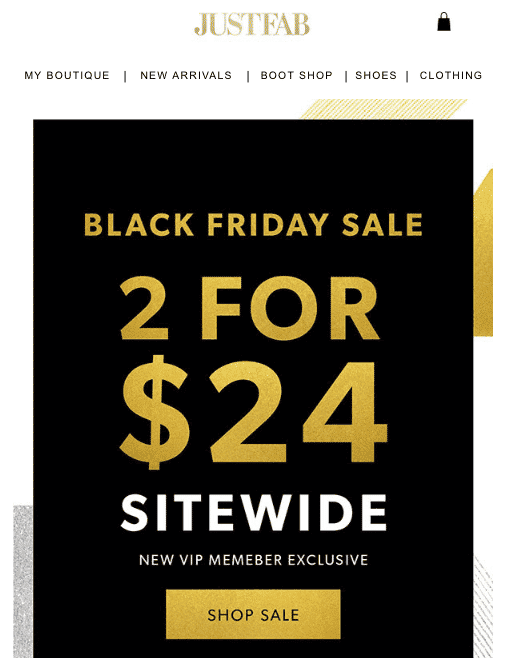
Nordstrom
For most marketers, discounts are instrumental in hitting Q4 numbers but of course, if you’re too promotional too often, you train your customers to avoid paying full-price like the plague. Discounts are especially tricky during the holidays, when people are more inclined to expect a deal, and Nordstrom approached that admirably. Cyber Monday shoppers still got a bang for their buck, but rather than a discount, the Nordstrom gave them cash… to spend at Nordstrom.
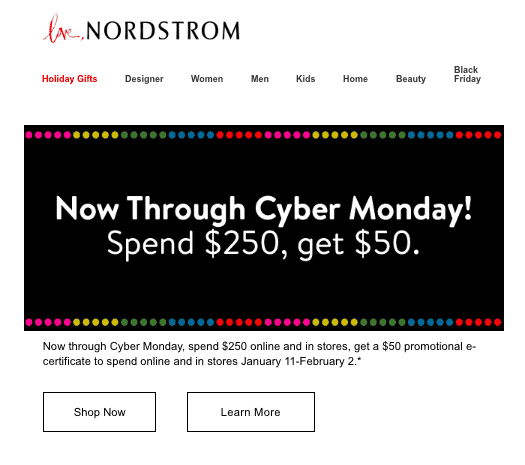
Adidas
There’s a lot to like about this Cyber Monday email from Adidas. The subject line made it clear that a discount this steep is rare. The sportswear giant also made the deadline clear, enticing customers to act fast. And of course, we loved the personalized aspect of gifting customized shoes. That boosts engagement and increases time on site, as shoppers have tons of variables — style, color, material, sneakerhead collaborator — to play with.

ShoeDazzle
Style is cyclical, which gives fashion retailers that many more product recommendation strategies to choose from. ShoeDazzle tapped into that, sending this email shortly before New Year’s Eve. We love the way the footwear retailer centered both their promotion and recommendations around the reminder that “it’s officially sparkle season.” And if sparkles aren’t your thing, ShoeDazzle was sure to include regular recommendations based on each customer’s activity.
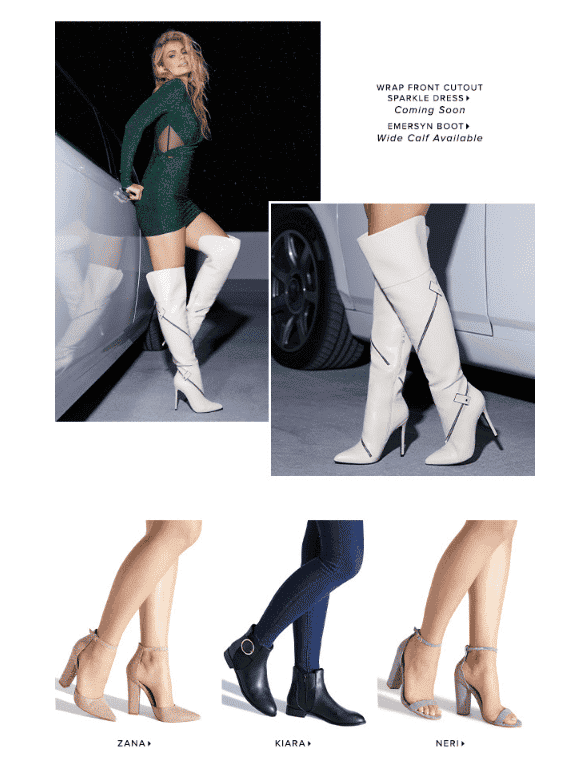
The State of Brand Loyalty in the U.S. in 2023
Related


